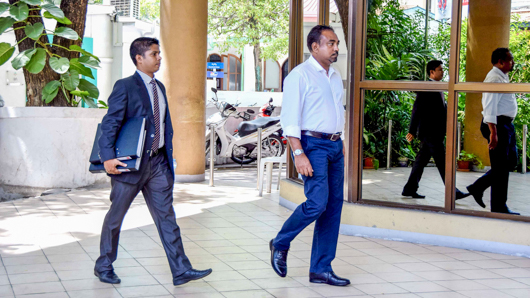Former defence minister Tholhath Ibrahim Kaleyfaanu was found guilty of terrorism and sentenced to 10 years in jail last night over the military detention of a judge while ex-president Mohamed Nasheed was in office.
Nasheed is currently serving a 13-year jail sentence over the same incident, in which criminal court chief judge Abdulla Mohamed was held for three weeks in January 2012.
Ex-colonel Mohamed Ziyad, one of the five accused in the case, was meanwhile acquitted last night.
The court said the prosecution’s evidence, witness testimony and Tholhath’s statements in court were sufficient to prove the former minister’s involvement.
However, the three-judge panel presiding over both cases ruled that Ziyad followed orders from his superiors, did not have any intention of unlawfully arresting the judge, and was not in a position to issue commands.
Several senior military officers had meanwhile said Tholhath had vowed to take responsibility for the judge’s 22-day detention on Girifushi island even if he were to be jailed for 40 years.
The judges also noted that Tholhath defied court orders demanding Judge Abdulla’s immediate release.
The verdicts were delivered last night following repeated cancellations after the hearings were concluded last month.
At a previous hearing, Tholhath said Nasheed had ordered the arrest of the judge.
The operation ‘Liberty Shield’ was initiated by Nasheed and carried out by then-Malé Area Commander Brigadier General Ibrahim Mohamed Didi, currently an opposition Maldivian Democratic Party MP for mid-Hithadhoo constituency, he said.
During the trial, state prosecutors said soldiers involved in the operation were not being charged as accomplices because senior officers of the military “used the institution as a veil to commit this atrocity”.
On Wednesday night, the criminal court acquitted Defence Minister Moosa Ali Jaleel of terrorism charges related to the judge’s arrest. The retired major general was chief of defence forces at the time, but maintained he had no role in the operation.
Of the five defendants charged with the “abduction” or “enforced disappearance” of the judge, only MP Didi’s verdict is still pending.
Didi’s trial did not progress beyond a few hearings as he had to be flown abroad for medical treatment half-way through the trial. He is yet to return to the country.
Judge Abdulla’s arrest sparked 22 nights of violent anti-government protests, culminating in a police and army mutiny on February 7, 2012. Nasheed resigned on the same day, but later said it was in order to avoid bloodshed and was in effect a forced resignation.
In January 2013, Tholhath told parliament’s government oversight committee that the events of February 7 was not a coup d’etat, after previously claiming Nasheed’s life was in danger and that the former president had no choice but to resign.
During the 2013 presidential campaign, Tholhath campaigned for Jumhooree Party Leader Gasim Ibrahim and later backed eventual winner Abdulla Yameen.
